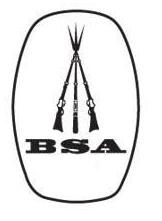| Country: | England | Primary Focus: | Bicycle Frames |
| Years of Operation: | 1943 - 1953 |
| General Information |
Paris Cycles was set up in 1943 or thereabouts by Harry
Rensch. Harry Rensch was already widely known in the cycling
world as “Spanner” Rensch. Rensch had
been well respected in the cycle business before the Second World War
as the originator of Rensch bicycles.
These were thoroughbred lightweights famous for their continental
finishes, Massed Start frame design and novel construction –
using lugless concepts made possible by a technique that the Rensch
literature referred to as “bronze welding” but
which is now better known as Sif-bronze brazing – a more
controlled technique giving a stronger frame than normal brass brazing
using lugs.
The pre-war bicycles were all true lightweights and most frames had
Osgear rear ends needed for the gears used in Massed Start road
racing During WW2 Rensch was an
oxy-acetylene welder in London’s shipyards. During
this time he managed to continue bicycle trading but at some point
decided to change the name of the firm to PARIS Cycles, probably in or
shortly after 1942. It is thought that the change was to
avoid
the association of his own name with German interests, and of course
there was at that time a violently anti-German feeling as a result of
the London Blitz, particularly in the dockland areas. The new PARIS
firm was set up in Rensch’s old home, 133 Stoke Newington
Church Street in N16. The first publicity material came out
in 1946 using this address.
The first frames advertised were the top of the line Tour de France (See image below) and
the cheaper clubman-aimed Professional Road Racer –commonly
known as the Professional. Demand for these bikes was considerable and
to add to this pressure was the commercial success of a new model, the
Galibier. This was a novel single main strut frame model with
the prettiest –or most handsome- (take your pick)
bilaminations at the head and strut joints. The Galibier had
its detractors and many a fierce argument was had over this style
guru’s dream machine.
The unexpected demand for the frames led to development of batch
production of the bikes and to fast and furious expansion of the
building space. Rensch had to take over the next door shop,
the firm’s address now being 129/133 Stoke Newington Church
Street. The enamelling shop also had its outside refinishing
service as an established a market niche and moved to larger premises
in Balls Pond Road near to the old Rensch firm’s pre-war
roots.
By 1948 the PARIS marque had produced an attractive catalogue with some
13 models including four tandems. Rensch himself still built
frames and there were RENSCH badged bicycles – these tended
to the more expensive and finely finished models such as the RENSCH
Champion du Monde in the range. As before all models were
supplied as frame only – the marquee’s loyal
enthusiasts were the type who were highly knowledgeable and selective
about the components they put on their bicycles. Of course supplying a
bicycle this way also avoided the swingeing 25% Purchase Tax the post
war Government imposed on complete new machines.
Rensch though personally a friendly and even jovial character was
beginning to suffer from diabetes and the pressure of running this
whirlwind of a venture must have been an enormous additional
strain. Those who came after certainly found the lack of
sound management techniques surprising and this must have been a major
cause of the firm’s problems. The collapse of the
firm in 1952 has been said to be due to cash difficulties and certainly
this was the case in a great many firms in the cycle trade at that time
in the late 1940’s. In the case of PARIS the end
was probably made inevitable because Harry also had marital problems
and broke up from his wife in late 1951. Harry’s
marriage break-up and his simultaneous departure from the firm meant
that a new manager was needed.
WB(Bill)Hurlow was asked to manage the frame building side of the
business in early 1952. Hurlow worked out of the old PARIS
workshops for a period, trying to make the PARIS name work.
However the firm was finally closed in 1953 and formally dissolved in
1955. Rensch never rejoined the cycle industry and died of
diabetes related diseases in 1984.
PARIS as a make did have a later incarnation when Michael Kemp, who had
bought the PARIS name, traded as the Paris Lightweight Cycle Company
Ltd. Monty Young of Condor Cycles, and Tom Board who was
Condor’s frame builder, were also Directors of this
venture. Tom Board, as the only builder, built high-class
replica PARIS Galibier and Tour de France frames between 1981 and
1987. Condor have
re-introduced the Galibier as a custom made retro design.

Paris
Galibier showing main strut bilaminates
Right: Paris
Galibier showing head bilaminates -
compare with
Tour de France below left with
the wider
gaps.
|

|
|
| History |
| [No history information available] |
| Bicycles & Frames |
| View Search List by Category |
| Road Race | | | |
| Recently Added / Updated Frame Models |
| Frame Model | Category | Added / Updated |
 Paris Frame Collection Overview Paris Frame Collection Overview |
| Head Badge Gallery |
| View All | Metal Attached | Painted or Decal | |
| Photo Selection from Recently Updated Items |
|
